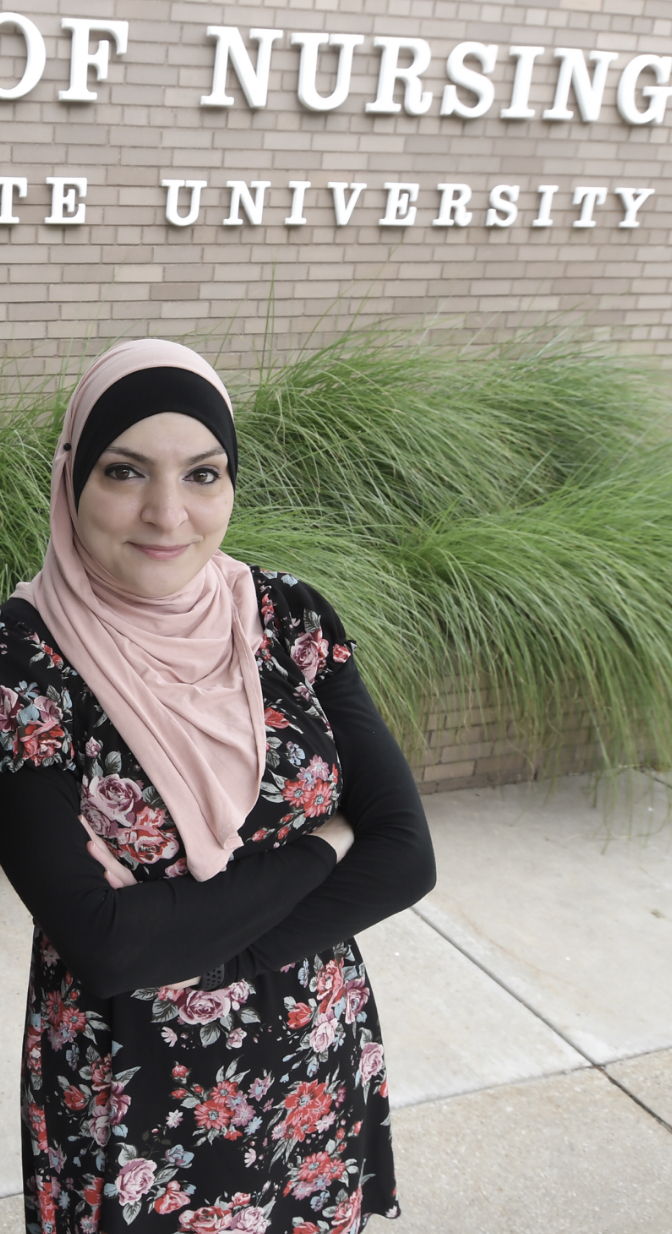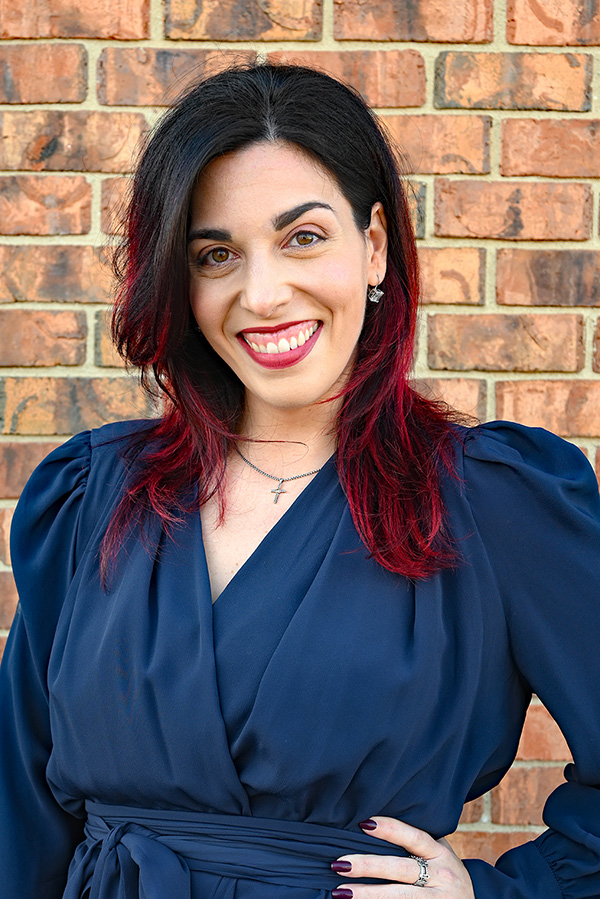PhD grads help lead College of Nursing’s Class of 2022 into next chapter
More than 150 students will enter the nursing profession or begin the next stage of their careers when they graduate from the Wayne State University College of Nursing this weekend. Two graduates, Cinzia Caparso and Samia Abdelnabi, represent a small but strong PhD cohort in this year’s graduating class and will address their peers during the college’s convocation and commencement ceremonies Saturday, May 7.
Difficult and deeply personal experiences have inspired each nurse scientist’s pursuit of a PhD and informed their doctoral research. Caparso’s dissertation, Identifying Dying Concerns in Dyads of African American Parents with Advanced Cancer (AAPWAC) with Dependent Children and their Co-Parent/Significant Other: A Phenomenological Study, explored the various concerns and implications of parents navigating a terminal cancer diagnosis and its impact on families. Abdelnabi’s dissertation, The Lived Experiences of Muslim Women with Infertility, examined how Muslim women perceive, understand and cope with infertility in the United States to address a knowledge gap that limits our awareness of how social, religious and cultural practices impact this population.
We spoke with Caparso and Abdelnabi to learn about their unique journeys in nursing and what led them to a PhD at Wayne State.
Why did you become a nurse?

CC: When I was younger, my mother was diagnosed with breast cancer. When other kids were going to after-school activities, I was going to the hospital to visit my mom. Being so young, I was never informed about what was actually going on with my mom, and I was always interested. I knew she had cancer, but I didn’t understand the extent. She passed when I was 8 years old. I thought being a nurse would be too hard emotionally and academically, but as I got older, I wanted to learn more about health care, and I found that I enjoyed caring for people when they were unwell. Ultimately, I decided to pursue nursing.
SA: It goes back to my upbringing. I grew up in Detroit and witnessed firsthand the health disparities many ethnic and racial minorities faced, including the lack of diversity in providers and the limited knowledge or general lack of awareness of a person’s cultural preferences. Another driving force was the lack of education regarding sexual and reproductive health among racial and ethnic minority youth and young adults. I thought as a nurse I could find ways to address those disparities for others like me and help women truly understand their bodies.
Where has your nursing career taken you so far?
CC: During my BSN studies, I worked as a student assistant in the skills lab at Oakland University’s School of Nursing — it was my first job. After graduation, I found a job at an oncology chemotherapy infusion clinic. I enjoyed my time there, but I really wanted to work in an inpatient oncology unit. In 2014, I started as a staff nurse in the oncology unit at Beaumont Health, where I practiced full-time for a year before starting my PhD at Wayne State. I remained contingent at Beaumont until 2018 while working as a research assistant at WSU. For the last five years, I’ve been a graduate teaching assistant in Wayne State simulation labs.
SA: After completing my BSN, I worked as a staff nurse at Oakwood Hospital [now Beaumont Hospital, Dearborn] on the cardiac step-down unit for two years. I then decided to return to school to complete my master’s in midwifery and transitioned to the labor and delivery unit until I graduated. I have worked at Hutzel Women’s Hospital, Oakwood, Saint Joseph Mercy Ann Arbor Hospital and now at Michigan Medicine as a midwife. I also taught women’s health to students in the family nurse practitioner program at South University for two years.
Why did you decide to pursue a PhD in nursing?

CC: I never thought I would obtain my PhD, but the majority of my career has been in or around academics. I love to learn about nursing science, and I wanted to make a bigger impact for the oncology patients I worked with. As I reflected on my time as a floor nurse, I knew my passion was in teaching our future nurses. In my career, I had the opportunity to work with a number of PhD-prepared nurses in academia, so I knew what the job entailed — I don’t think many undergraduate nurses get to see that. I knew I would need to get a PhD to reach my career goal.
SA: I decided to pursue a PhD because I love teaching. I currently work at the University of Michigan precepting midwifery students and medical students while working closely with residents, and I really enjoy it. I’m also passionate about research, which I never thought I would enjoy. After experiencing infertility and finding a lack of knowledge and support for Muslim women going through that, I knew I needed to complete my PhD so I could use my knowledge to support racial, religious and ethnic minorities through difficult diagnoses.
Why did you choose the Wayne State College of Nursing?
CC: Wayne State was one of the few schools to offer a BSN-to-PhD track. Then I thought about my professors at Oakland University and realized most of them earned their doctorates from Wayne State. Once I started to look more closely at the WSU College of Nursing, I saw its focus on preparing nurses to care for urban populations, reduce health disparities and promote health in the community by working with nursing researchers. I also appreciated Wayne State’s relationship with the Karmanos Cancer Institute and the faculty researchers who were studying various aspects of cancer care. With all of that together, I knew the Wayne State College of Nursing was the right fit for me.
SA: After deciding to pursue a PhD in nursing, choosing the university I wanted to apply to was one of the easiest decisions I made. This is my third degree from the WSU College of Nursing: I completed my BSN, MSN and now PhD. I’ve returned to Wayne State because it’s in the heart of Detroit with a very diverse community, not only in the population we serve but also the students within the program.
How was your experience in the PhD program?
CC: When I first started the PhD program, I had serious doubts that I was smart enough to complete this degree. In my first semester, I asked my professor if I should drop her class because I was so overwhelmed by the coursework, but she met with me one on one to help me succeed. Once I had that first semester under my belt, I felt more confident. I think the one thing that reassured me I was on the right track was when I was named a Jonas Scholar, receiving a scholarship that supports doctoral nursing students whose research addresses the nation’s most pressing health care needs. I also credit the mentorship of Ramona Benkert and Katherine Balint, which has meant more to me than they will ever know. They saw potential in me and reminded me of it when I wanted to give up.
SA: I have been truly supported throughout my entire journey, and I am very appreciative of the entire faculty and staff at the College of Nursing and Graduate School. Being a Robert Wood Johnson Foundation Future of Nursing Scholar was an unforgettable experience. The foundation provided a full-ride scholarship that allowed me to focus on classes and research and attend educational seminars that strengthened my knowledge as a nurse scientist. I will always remember and appreciate the commitment, encouragement and support I received from my committee members, Deborah Walker, April Vallerand, Lauren Duquette-Rury and Patricia Hershberger. They made my entire PhD experience enjoyable, and I would not have completed my dissertation without their support.
Any advice for those considering a PhD in nursing?
CC: Know that a PhD in nursing research is not the same as your undergraduate nursing research courses. It is an opportunity to become an expert in your area of interest and make an impact on your population of interest and global nursing science. You don’t need to be a straight-A student to get a PhD, but you do need to work hard and be determined. There will be tough times, but it’s important to see the bigger impact of being a PhD-prepared nurse who can advance our collective knowledge and educate the nurses of tomorrow.
SA: It was the best decision I’ve made. While the PhD program can be challenging, it is worth every moment. Nurses have so much to give, and completing a PhD gives you the skills to enhance the body of health care knowledge, become a change agent and create meaningful interventions that will improve patient care. We need doctorally prepared nurses more than ever. Educating future nurses and being a part of research that can have a significant impact on our communities is very rewarding.
What’s next for you after graduation?
CC: I have accepted a two-year postdoctoral position at the University of Michigan, where I will be advised by Sung Won Choi, a pediatrician, and Christopher Friese, a PhD-prepared nurse, on research involving bone marrow transplant patients of all ages and their caregivers on health-related quality of life outcomes. Once I complete this postdoctoral position, I plan on finding an assistant professorship with a tenure track at a research-intensive university.
SA: Short term, I plan on completing my postdoctoral training at the University of Michigan as a National Clinician Scholar, which is a two-year program. Once I complete my postdoc, I plan to apply for a teaching position at a university in the state and hope to continue practicing as a midwife.